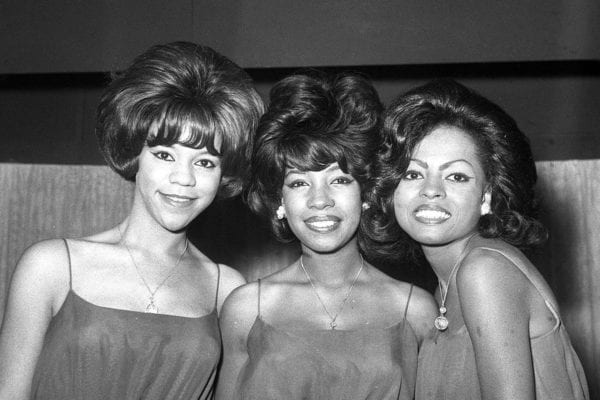
I suppose you had to be there – a kid coming of age in the 1960s. Then, as now, life was marked by riots, race and rebellion.
In the middle of it all, for teenagers, was the music – more specifically the Beatles and Motown.
The Beatles were John, Paul, George and Ringo. Motown was the Four Tops, the Temptations, Stevie Wonder, Marvin Gaye and, especially, the Supremes.
Diana Ross, Florence Ballard and Mary Wilson, – who died Monday at 76 – forever changed the concept for female singing groups. They could be as soulful, powerful and magnetic as any boy band.
For the Supremes, it wasn’t just the song that made them so irresistible. It was the way they looked, dressed and moved on stage – a combination of glamour, sophistication, elegance and soul. And it knew no racial boundary. These three young ladies from the projects in Detroit showed the world that talent and music mattered more than skin color.

The Supremes were aided by songwriters like Brian Holland, Eddie Holland and Lamont Dozier. They were backed by the great Motown band and the Funk Brothers.
And the genius behind it all was Motown founder Berry Gordy Jr., who produced Supremes’ records along with fellow Motown legend Smokey Robinson.
During the ‘60s, young people didn’t just measure time on a calendar. Music brought its own schedule. Every three months or so, the Beatles and the Supremes would release a hit single, followed, usually a month later, by an album.
I can’t remember much about 1964, but I’ll never forget seeing the Beatles on the “Ed Sullivan Show.” Also filling my memory banks of that year are Diana, Flo and Mary breaking my hi-fi speakers with “Where Did Our Love Go,” “Baby Love” and “Come See About Me.”
And as I went from junior high to high school, the Supremes’ hits just kept on coming:
1965: “Stop In the Name of Love,” “Back In My Arms Again,” “Nothing But Heartaches,” “I Hear A Symphony” and “My World Is Empty Without You Babe.”
1966: “Love Is Like An Icthin’ In My Heart,” “You Can’t Hurry Love” and “You Keep Me Hangin’ On.”
1967: “Love Is Here & Now You’re Gone,” “The Happening” and “Reflections.”
There you have it, three years and a generational soundtrack that never gets old. Today, I don’t need a record player to hear those songs in my head. Later, there were more Supremes’ hits, “Love Child” and “Someday We’ll Be Together,” but the “Dream girls” couldn’t last.
By 1970, they were called Diana Ross and the Supremes. Ross, a favorite of Motown founder Berry Gordy, left to go solo and make movies.
As with many Motown acts, life after music turned tragic for one Supreme. Florence Ballard, struggled with alcohol and depression and died of a heart attack at 32, in 1976.

Mary Wilson, though, kept on keeping on. She stayed with the new Supremes through the mid-70s, She wrote her autobiography in 1986, “Supreme Faith: Someday We’ll Be Together.” Wilson played major concerts and clubs and was part of the Supremes’ 1988 induction into the Rock and Roll Hall of Fame.
Which brings us to 2018 in The Villages’ Savannah Center.

There we were: me and Mary Wilson. She was up on stage, glamorous as ever at 74. She casually flaunted an oversized white boa stole that snaked around her shoulder and highlighted by a black sequined gown.
Mary and I never met, never talked, but somehow, that night, I felt that the musical bond that brought us together remained strong.
Times had changed. Wilson talked about her 10 grandchildren and flying into Florida during a raging thunderstorm.
She smoothly riffed through a catalogue of hits, including “You Can’t Hurry Love,” “Love Child” and “Reflections.”
Diana Ross sang lead on those songs, but it didn’t matter. Mary Wilson was nearly as supreme as a 74-year old singer could be. There was joy in her voice, unaltered by age. I wrote that Wilson was, “sexy, sassy and most of all, pleased the people remembered the music and the singer.”
The concert highlight came at the end of the show when Wilson called up about 25 fans to the stage to join in the finale.
The Baby Boomers were in Supremes’ ecstasy, singing and dancing with Mary to “Baby Love,” “Stop in the Name of Love” and “You Keep Me Hangin’ On.”
“It’s so cool,” Villager Anne Thomas told me. “Mary Wilson was so nice to us.”
Michelle Oten, another fan in The Villages, said: “That music will never go out of style. Long after we’re all gone, people will be playing those songs.”
I thought of those words Tuesday morning when I read that Wilson died. Diana Ross remembered Wilson this way with a statement on Tuesday: “I have so many wonderful memories of our time together. The Supremes will live on, in our hearts.”
Mary Wilson echoed that sentiment on stage in The Villages.
“I’m proud of our records, and I’m happy,” she said. “Thank you for remembering.”

